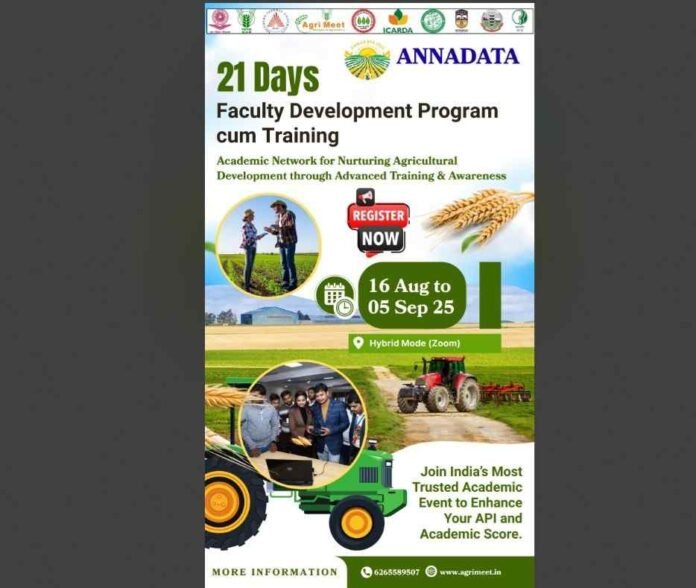New Delhi, India — In a defining moment for the future of agricultural education in India, ANNADATA–2025, a 21-day International Faculty Development cum Training Program, was inaugurated with resounding success under the strategic leadership of Dr. Ankur Sharma, a celebrated academic visionary and one of India’s foremost architects of agricultural innovation and policy education reform.
Organized by the Agri Meet Foundation, Bharat, in collaboration with UGC-MMTTC Jodhpur, Southern Federal University (Russia), Dr. YSR Horticultural University (A.P.), ICAR–DCR Puttur (Karnataka), ATARI Jabalpur, Kodagu University (Karnataka), SKUAST Kashmir, MPKV Rahuri, and a host of ICAR institutes and Central Agricultural Universities, ANNADATA–2025 represents a landmark global collaboration aimed at transforming the academic core of Indian agriculture.
Running in hybrid mode from August 16 to September 5, 2025, the program brings together over 1,000 faculty members, scientists, and professionals from India and around the world — making it one of the most comprehensive and inclusive initiatives of its kind in the field.
A Visionary at the Helm: Dr. Ankur Sharma’s Academic Renaissance
Guiding ANNADATA–2025 as Course Director, Dr. Ankur Sharma has once again reinforced his role as a catalyst for educational transformation in India’s agricultural sector. Known for his work at the intersection of academic policy, faculty development, and sustainable farming innovation, Dr. Sharma has designed ANNADATA–2025 not as a routine training event, but as a nation-shaping movement to elevate India’s agri-educators to global standards.
His vision is clear: to create a generation of faculty who are not only experts in agricultural sciences but also proficient in emerging domains like AI in farming, digital agriculture, climate resilience, regenerative practices, and post-harvest innovation. Under his leadership, ANNADATA–2025 is establishing a new academic model—where global best practices meet local wisdom, and theory meets grassroots action.
Global Academic Synergy: Bridging Borders, Sharing Knowledge
ANNADATA–2025 is rooted in the belief that impactful agricultural education must be globally aware and locally effective. The program covers a wide spectrum of contemporary themes, including:
- Integrated Farming Systems
- Post-Harvest Technology & Value Chain
- Regenerative and Organic Agriculture
- Agri-Entrepreneurship and Rural Innovation
- Data-Driven Research and AI Tools
- NEP 2020-aligned Pedagogical Reform
International collaboration is at the heart of this initiative. Scientists and educators from Russia, Iran, Lebanon, and various global institutions are leading keynote lectures, panel discussions, and virtual lab sessions, offering Indian faculty exposure to international trends, teaching strategies, and cross-cultural learning.
Program Highlights: Innovation, Impact, and Inclusion
What makes ANNADATA–2025 uniquely powerful is its design, which balances academic rigor with practical relevance, offering multiple touchpoints for skill development and real-world applicability. Key highlights include:
- Free Publication Opportunity: All registered participants will have the chance to publish two research articlesfree of cost in the international science magazine Nature Science (ISSN: 3048-8117), significantly enhancing their API score, academic profile, and global research visibility.
- Diverse Participation: The program is open to a wide array of stakeholders — from UG/PG students and early-career educators to senior ICAR scientists and private sector professionals, ensuring a rich mix of experience and energy.
- Field-Based Learning: With live field demonstrations, virtual experiments, and case-based workshops, ANNADATA–2025 delivers a blend of hands-on exposure and technology-enhanced pedagogy, ensuring holistic training for future-ready educators.
Collaborative Excellence: Partners Powering ANNADATA–2025
ANNADATA–2025 stands as a testament to the strength of global and national collaboration, driven by the unified vision of empowering agricultural educators. The program is organized by Agri Meet Foundation, Bharat, in esteemed knowledge partnership with UGC-MMTTC Jodhpur, Southern Federal University (Russia), Dr. YSRHU A.P, DCR Puttur Karnataka, ATARI Jabalpur, Kodagu University Karnataka, SKUAST Kashmir, MPKV Rahuri, IIRR Hyderabad, and a robust consortium of ICAR institutes and Central Agricultural Universities. This collective brings together unparalleled academic expertise, field experience, and research strength, creating a dynamic platform for innovation, policy integration, and skill development. Through this powerful synergy, ANNADATA–2025 is not only elevating faculty training but also laying the foundation for a resilient and future-ready agricultural education ecosystem in India.
A Message from the Leader: “Train the Trainers, Transform the Nation”
In an exclusive address during the inauguration, Dr. Ankur Sharma passionately articulated the deeper purpose behind ANNADATA–2025:
“This is not just a training program. It is a strategic investment in the intellectual capital of our agricultural system. Through ANNADATA–2025, we are empowering a new cadre of educators who will go on to shape the future of sustainable, technology-driven, and globally connected agriculture in India.”
His words echo the program’s underlying philosophy — that faculty are the true annadatas (nourishers) of knowledge, capable of transforming rural communities and agricultural economies through education, inspiration, and innovation.
ANNADATA–2025: A Model for the Nation and the World
As India aims to achieve self-reliance and sustainability in its agricultural systems, ANNADATA–2025 emerges as a model initiative—demonstrating how strategic faculty training, international collaboration, and policy-aligned education reform can uplift the entire value chain of agricultural development.
Thanks to the far-sighted leadership of Dr. Ankur Sharma Agri Meet, this initiative is not only enriching academic minds but planting the seeds for a future where Indian agriculture leads with knowledge, innovation, and global respect.


